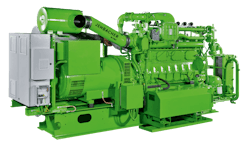Industry Alliance honors CHP Power Plants at Puerto Rico industrial site and Purdue University
Mission-critical combined heat and power (CHP) projects serving an Indiana university and another powering an industrial plant in Puerto Rico were honored by the Combined Heat and Power Alliance recently.
The CHP Alliance, which is an industry support group comprised of businesses, contractors and education organizations, announced project awards for the Duke Energy-Purdue University collaboration and Hewlett Packard facility in Puerto Rico as its CHP Projects of the Year.
CHP facilities provide resilient, on-site power generation at facilities such as military bases, college campuses, hospitals and industrial manufacturing plants. The technology is considered highly energy efficient because the heat created by electricity generation is also used for heating, cooling and industrial needs.
The CHP Alliance named Hewlett Packard (HP) and contractor Accurate Solutions Corp. for their work on the power plant in Aguadilla, PR. Accurate Solutions designed, built, operates and maintains the facility for HP.
The Aquadilla CHP plant includes two Innio Jenbacher engines, both rated at 2 MW capacity. The plant project also includes absorption cooling, battery energy storage and technology to “island” the plant from the main grid when needed.
See EnergyTech's full coverage of CHP projects in the C&I Energy Transition
More on Distributed Energy announcements industry wide
Subscribe to our free, tri-weekly email newsletter
In fact, the HP facility, which makes ink and other products, was able to stay in operation even during the Category 4 Hurricane Fiona storm which inflicted extreme damage to Puerto Rico. The engines also help the company meet decarbonization goals as the engines are fueled by landfill natural gas, which helps remove methane from the atmosphere.
The CHP Alliance also honored the work between Duke Energy and Purdue University for the 16-MW turbine operating to benefit the West Lafayette campus in Indiana. The Purdue facility supports power needs for the university but also dispatch electricity into the Duke Energy Indiana service territory.
Duke Energy operates the CHP plant, which also provides up to 150,000 pounds of steam per hour and is projected to reduce CO2 emissions by 50,000 metric tons. The CHP plant was opened this past spring.
Purdue University purchases all of the steam under a long-term agreement. The school’s sports teams, incidentally, are called the Boilermakers.
Most CHP power plants are fossil-fueled, usually natural gas but also some coal and biofuels. The efficiency driven by the twin uses of the systems, however, usually provides a net reduction in greenhouse gas emissions compared to other flexible and baseload generation technologies.
Combined heat and power plants account for close to 80 GW of capacity at more than 3,000 sites throughout the U.S., according to the CHP Alliance and other sources.
-- -- --
(Rod Walton, senior editor for EnergyTech, is a 14-year veteran of covering the energy industry both as a newspaper and trade journalist. He can be reached at [email protected]).
Follow us on Twitter @EnergyTechNews_ and @rodwaltonelp and on LinkedIn
About the Author
Rod Walton, EnergyTech Managing Editor
Managing Editor
For EnergyTech editorial inquiries, please contact Managing Editor Rod Walton at [email protected].
Rod Walton has spent 17 years covering the energy industry as a newspaper and trade journalist. He formerly was energy writer and business editor at the Tulsa World. Later, he spent six years covering the electricity power sector for Pennwell and Clarion Events. He joined Endeavor and EnergyTech in November 2021.
Walton earned his Bachelors degree in journalism from the University of Oklahoma. His career stops include the Moore American, Bartlesville Examiner-Enterprise, Wagoner Tribune and Tulsa World.
EnergyTech is focused on the mission critical and large-scale energy users and their sustainability and resiliency goals. These include the commercial and industrial sectors, as well as the military, universities, data centers and microgrids. The C&I sectors together account for close to 30 percent of greenhouse gas emissions in the U.S.
He was named Managing Editor for Microgrid Knowledge and EnergyTech starting July 1, 2023
Many large-scale energy users such as Fortune 500 companies, and mission-critical users such as military bases, universities, healthcare facilities, public safety and data centers, shifting their energy priorities to reach net-zero carbon goals within the coming decades. These include plans for renewable energy power purchase agreements, but also on-site resiliency projects such as microgrids, combined heat and power, rooftop solar, energy storage, digitalization and building efficiency upgrades.

